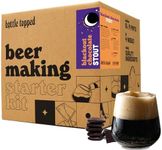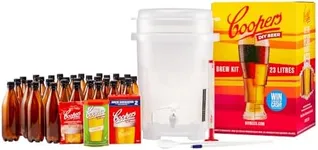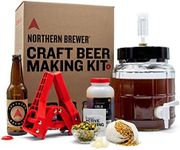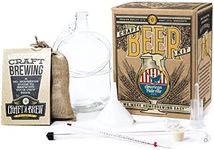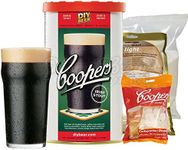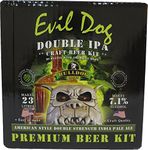Buying Guide for the Best Home Brew Kits
Choosing the right home-brew kit is essential for anyone looking to start brewing their own beer, cider, or other beverages at home. The right kit will not only make the process easier but also ensure that you achieve the best possible results. When selecting a home-brew kit, consider your level of experience, the type of beverage you want to brew, and the space you have available. Understanding the key specifications of home-brew kits will help you make an informed decision that aligns with your brewing goals and lifestyle.Type of BeverageThe type of beverage you want to brew is a fundamental consideration when choosing a home-brew kit. Kits are often designed specifically for beer, cider, wine, or even kombucha. This is important because each type of beverage requires different ingredients and brewing processes. If you're a beginner, you might want to start with a beer or cider kit, as they are generally more straightforward. If you have a specific preference, look for a kit that caters to that beverage. Your choice should reflect your taste preferences and the type of brewing experience you want to have.
Batch SizeBatch size refers to the amount of beverage you can produce in one brewing cycle. This is important because it determines how much product you will have at the end of the process. Kits typically range from small batches of 1 gallon to larger batches of 5 gallons or more. If you're just starting out or have limited space, a smaller batch size might be more manageable. However, if you plan to share your brew with friends or family, or if you consume a lot, a larger batch size could be more economical. Consider your consumption habits and storage space when deciding on batch size.
Equipment IncludedHome-brew kits come with varying levels of equipment, from basic to comprehensive. This is important because the equipment included will determine what additional items you may need to purchase. Basic kits might include just the essentials like a fermenter and airlock, while more comprehensive kits could include items like a hydrometer, bottling equipment, and cleaning supplies. If you're a beginner, a kit with more equipment can be helpful as it provides everything you need to get started. If you already have some brewing equipment, you might opt for a kit that fills in the gaps.
IngredientsThe ingredients included in a home-brew kit are crucial as they directly affect the flavor and quality of your brew. Most kits come with pre-measured ingredients such as malt extract, hops, yeast, and sometimes flavorings or additives. This is important because it simplifies the brewing process, especially for beginners. If you have specific taste preferences or dietary restrictions, look for kits that offer customizable ingredients or options for organic or gluten-free brewing. Your choice should align with your flavor preferences and any dietary considerations you may have.
Skill LevelHome-brew kits are often tailored to different skill levels, from beginner to advanced. This is important because it ensures that the kit matches your experience and comfort level with brewing. Beginner kits typically include detailed instructions and are designed to be foolproof, while advanced kits might assume some prior knowledge and offer more complex recipes. If you're new to brewing, start with a beginner kit to build your confidence. If you have some experience, you might enjoy the challenge of an intermediate or advanced kit. Choose a kit that matches your current skill level to ensure a successful brewing experience.


